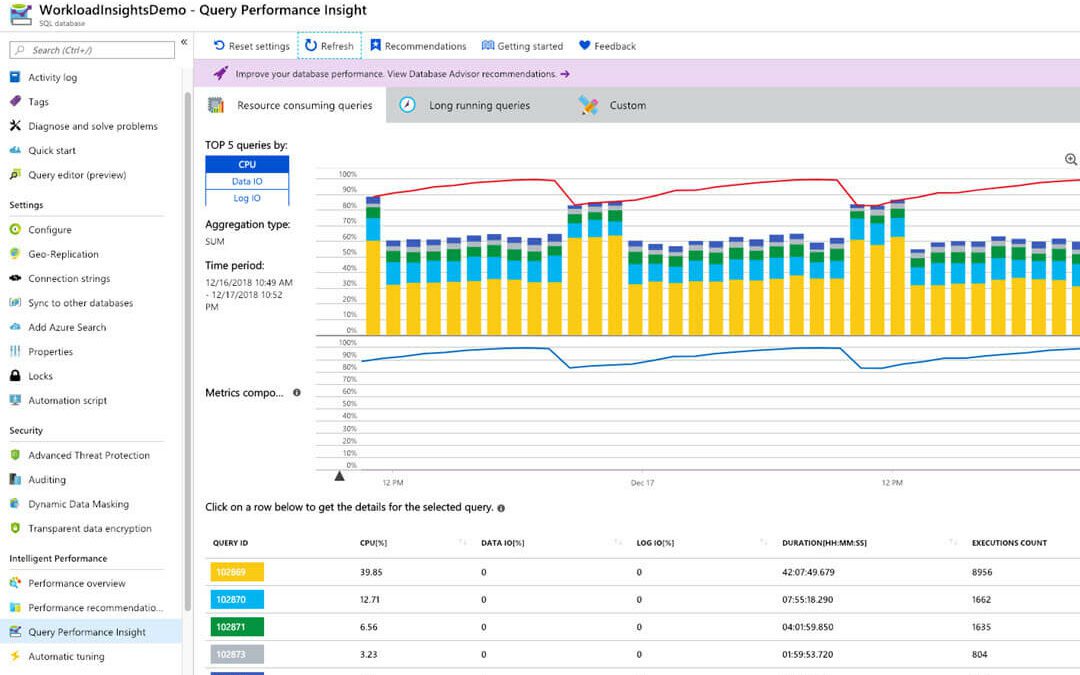A secure, functional, and robust database is essential for modern business organizations. There are many database options on the market, each with unique advantages. One of the most dynamic and flexible products available is Azure SQL. But perhaps you may wonder: what is Azure SQL, and how does it relate to other SQL tools, such as SQL Server?
In the information below, we’ll discuss what Azure SQL is, its different solutions, and some of the key benefits of using it for business transactions and other vital data.
What is Azure SQL? An Overview
“SQL” is an acronym for “Structure Query Language.” Most database systems use this programming language to create, read, update, and delete records in a standardized manner.
Microsoft defines Azure SQL as “a family of managed, secure, and intelligent products that use the SQL Server database engine in the Azure cloud.” Since Azure SQL utilizes the SQL Server infrastructure, many assume it is the same as SQL Server, only running within the Azure Cloud environment. While this comes close to the truth, it’s not 100% accurate.
The reality is there are several fundamental differences between Azure SQL and SQL Server. For example, Microsoft SQL Server databases are the only entity on the server. In contrast, Azure SQL allows a single database to host multiple databases within itself from various customers. Therefore, Azure SQL is considered to have “multitenancy” and shares its resources with all clients using the service in question.
Azure SQL Encompasses 3 Separate Products
Returning to Microsoft’s definition, it’s also important to note that the term “Azure SQL” can refer to any of 3 unique Microsoft products. These products are:
- Azure SQL Database. This product includes modern Cloud support on a managed database service.
- Azure SQL Managed Instance. Azure SQL Managed Instance allows you to modernize a current SQL Server solution at scale. This service offers nearly 100% feature parity with the SQL Server engine. Microsoft recommends this as the best option for data source migrations to the Cloud.SQL Server on Azure VMs. Finally,
- SQL Server on Azure VMs allows users to run SQL Server inside a fully managed virtual machine.
Since Azure SQL server products are built upon the SQL Server infrastructure, a working knowledge of that engine can help you migrate data over to this Cloud-based solution more efficiently and use it to its fullest potential.
What are the Differences Between Azure SQL Products?
Now that we’ve seen the general overview of Azure SQL, let’s drill down into some of the key differences between the 3 products outlined above.
1. Azure SQL Database
Microsoft defines Azure SQL Database as a “relational database-as-a-service (DBaaS)” product that falls in the Platform-as-a-Service (PaaS) category. Azure SQL DB offers the following features to users:
- The implementation of the latest stable SQL Server features
- A fully managed SQL Server database engine
- A pay-as-you-go subscription model that allows users to scale up or down, depending on the functionality that’s required
- Built-in high availability, intelligence, and management
- Deployment via one of two options
Regarding the last point, you can deploy Microsoft Azure SQL Database as a single database managed through a logical SQL Server or as an “elastic pool,” a set of databases that all draw from the same resource pool (also managed through a logical server).
2. Azure SQL Managed Instance
Microsoft’s Managed Instance option is also considered a PaaS product and is the company’s recommended solution for most Cloud migrations. SQL Managed Instance comes with a repository of built-in resources that can serve as an excellent foundation for your specific business needs. An instance of Azure SQL Managed Instance is similar to an instance of the “traditional” SQL Server (an “instance” is a copy of the sqlservr.exe file that runs as an operating system service).
Azure Managed Instance offers the following features:
- Implementation of the latest stable SQL Server features
- Data migration from new or existing applications to the Cloud with as few changes as possible
- An SQL Server native virtual network
- Nearly 100% compatibility with SQL Server on-premises
3. SQL Server on Azure VM
In contrast to the other two products discussed above, SQL Server on Azure Virtual Machine (VM) falls into the Infrastructure-as-a-Service (IaaS) category. Users of this product can operate their Azure SQL database engine within a fully managed virtual machine (VM).
SQL Server on Azure VM offers the following features:
- A SQL Server instance hosted in the Cloud which can run on Windows Server or Linux VMs operating within the Azure platform
- Database migrations that can take place without any changes (in most cases)
- Lift-and-shift infrastructure for existing applications that require a quick data migration to the Cloud
- Complete administrative management of the SQL Server instance and underlying operating system
- Complete control over the database engine itself
In simple terms, the differences between these 3 products can be summarized this way:
- SQL Azure Database offers the lowest cost and the least amount of customization
- SQL Server on Azure VM comes with the highest cost but also the most significant amount of control over your database environment
- SQL Azure Managed Instance strikes a balance between the other two options
What are the benefits of using Azure SQL?
There are many compelling reasons why you should consider using Azure SQL for your business’ database needs. Some of the more important benefits of doing so include the following:
1. The Freedom to Increase Focus on Your Core Competencies
Creating, updating, and managing a database environment can be time-consuming and labor-intensive, even with adequate support. All of this effort can end up distracting you from other mission-critical tasks.
In contrast, managing services can give you the freedom to focus your energy on other vital operational areas of your business. Whether you require a database engine that can handle advanced data processing at a global scale or need a framework for relatively straightforward transactional data, Azure SQL may be the perfect solution for your company.
2. The Ability to Quickly Scale your Database (Up or Down)
As your company expands, it may be necessary to migrate your data to a more powerful or secure environment as a precursor to future growth. Azure SQL facilitates growth by allowing users to quickly scale up or down according to current and projected business needs.
For example, Azure SQL DB allows customers to create a Hyperscale database that leverages Azure architecture to scale out Azure storage and computational resources substantially beyond the limits available for General Purpose and Business Critical service tiers.
Migrating to Azure SQL will allow you to quickly scale your SQL data storage and processing capacity without investing many physical resources.
3. The Convenience and Security of Using Built-In Intelligence
The Azure SQL family of products is full of pre-programmed intelligence that can learn and adapt to your workload. When your database engine is powered by machine learning, you won’t have to spend an inordinate amount of time and effort on continuous improvements. Instead, you’ll be able to focus on running your business.
At the same time, Azure’s Intelligent Performance tools mine your database(s) for insights, automatically monitor and tune your performance, and present you with helpful reports and suggestions.
In addition, Intelligence Protection tools can help ensure that your database remains secure and compliant with all applicable regulations. For instance, Azure SQL’s Advanced Threat Protection features provide users with an additional layer of security by alerting them to anomalous activities within the database.
4. Reduced Costs and Increased Productivity Levels
Finally, utilizing Azure SQL can result in cost savings and enhanced productivity. One Forrester study found that customers who migrated their data to the Cloud using Azure SQL-managed databases were projected to gain a return on investment of 238% over three years. Other benefits of an Azure SQL implementation include:
- An increase of 25% in IT productivity
- An increase of 40% in productivity for database administrators in particular
- Cost reduction benefits, including the avoidance of up to $5.4 million in costs related to computing processing power, storage, and data center space, etc.
This study and other empirical and anecdotal evidence indicate that the upfront costs of performing a data migration to Azure SQL will likely result in significant cost savings over the long run.
How to leverage Azure SQL for continued business growth
Azure SQL may be the perfect solution to meet your scalable database requirements. At IncWorx, we are experts in installing, deploying and managing Azure SQL (along with the more traditional Microsoft SQL Server). We have helped scores of clients to meet their current and future business needs with the help of the Azure SQL platform.
Moving Beyond What is Azure SQL
If you want to explore the possibility of migrating your data to Azure SQL, reach out to our team to begin the conversation about our Azure Database Migration Service. We can help you find an edge over the competition by reducing costs, optimizing your database environment, and streamlining your workflows.



